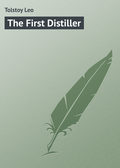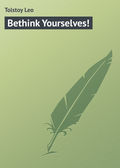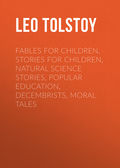
Лев Толстой
Tolstoi for the young. Select tales from Tolstoi
THE GREAT BEAR
A long, long time ago there was a big drought on the earth. All the rivers dried up and the streams and wells, and the trees withered and the bushes and grass, and men and beasts died of thirst.
One night a little girl went out with a pitcher to find some water for her sick mother. She wandered and wandered everywhere, but could find no water, and she grew so tired that she lay down on the grass and fell asleep. When she awoke and took up the pitcher she nearly upset the water it contained. The pitcher was full of clear, fresh water. The little girl was glad and was about to put it to her lips, but she remembered her mother and ran home with the pitcher as fast as she could. She hurried so much that she did not notice a little dog in her path; she stumbled over it and dropped the pitcher. The dog whined pitifully; the little girl seized the pitcher.
She thought the water would have been upset, but the pitcher stood upright and the water was there as before. She poured a little into the palm of her hand and the dog lapped it and was comforted. When the little girl again took up the pitcher, it had turned from common wood to silver. She took the pitcher home and gave it to her mother.
The mother said, “I shall die just the same; you had better drink it,” and she handed the pitcher to the child. In that moment the pitcher turned from silver to gold. The little girl could no longer contain herself and was about to put the pitcher to her lips, when the door opened and a stranger entered who begged for a drink. The little girl swallowed her saliva and gave the pitcher to him. And suddenly seven large diamonds sprang out of the pitcher and a stream of clear, fresh water flowed from it. And the seven diamonds began to rise, and they rose higher and higher till they reached the sky and became the Great Bear.
THREE QUESTIONS
It once occurred to a King that if he knew the right moment when to begin on any work and the right kind of people to have or not to have dealings with and the thing to do that was more important than any other thing, he would always be successful.
And he proclaimed throughout his kingdom that he would give a great reward to any one who could tell him what was the right moment for any action, and who were the most essential of all people, and what was the most essential thing of all to do.
Many learned men came to the King and answered his questions in different ways.
In answer to the first question some said that to know the right time for any action, one must draw up a time-table of all the days, months and years and observe it strictly, then one could do everything at the proper time. Others said that it was impossible to decide beforehand the proper time for any action; the only thing one could do was to waste no time in vain amusements, but to pay attention to what was going on around one, and to do the thing that came to hand. A third said that however attentive the King might be to what went on around him, one man alone could not decide the proper time for every action and that he needed a council of wise men to advise him. Still a fourth maintained that as certain action had to be decided at once and could not wait a council the proper thing to do was to find out beforehand what was going to happen so as to be always prepared. But as only magicians knew what was going to happen, then it followed that in order to find out the proper time for any action one must consult the magicians.
The second question, too, was answered in various ways. Some said that the most essential people to the King were his helpers and ministers; others said priests; still others that the most essential people to the King were doctors; a fourth party said that the most essential people to the King were soldiers.
To the third question about the most important occupation, some declared it was science, others, the art of war, and others, divine worship.
The answers being different, the King agreed with none of them and gave no man the promised reward. But still wishing to find out the answers to his questions, he resolved to consult a hermit who was famous throughout the land for his wisdom.
The hermit lived in a wood which he never left, and received none but common folk. For this reason the King put on simple garments, and, dismissing his body-guard before he reached the hermit’s cell, he climbed down from his horse and went the rest of the way alone and on foot.
He found the hermit digging a bed in front of the hermitage. When the hermit saw the King, he greeted him and went on with his digging. He was frail and thin and each time he dug his spade into the ground and turned over a little soil, he gasped for breath.
The King approached him and said, “I have come, oh, wise hermit, to ask you to give me the answers to these three questions – what hour must one remember and not allow to slip by, so as not to regret it afterwards? What people are the most essential and with whom should one or should one not have dealings? What things are the most essential to do and which of those things must one do first of all?”
The hermit heard what the King had to say, but made no reply. He spat on his hand and went on with his digging.
“You are tired,” the King said; “give me the spade and I will do the digging for you.”
The King took the spade and began to dig, but after a while he stopped and repeated his question. The hermit made no reply, but stretched out his hand for the spade.
“You rest now,” he said, “and I will work.”
But the King would not give up the spade and went on with the digging. One hour passed and another; the sun began to set behind the trees when the King stuck his spade into the ground and said, “I came to you, wise man, to find the answers to my three questions. If you cannot answer them, then tell me and I will go my way home.”
“Some one is running hither,” the hermit said. “Let us see who it is.”
The King turned and saw a bearded man running towards them. The man’s hands were clasped over his stomach and the blood flowed from beneath them. He fell at the King’s feet and lay motionless, rolling his eyes and moaning faintly.
The King and the hermit unfastened the man’s clothes. He had a large wound in his stomach. The King bathed it as well as he could with his handkerchief and bandaged it with the hermit’s towel. The blood did not cease to flow, and several times the King had to remove the bandages, soaked with warm blood, and rebathe and rebandage the wound.
When the blood ceased to flow, the wounded man came to himself and asked for some water. The King brought some fresh water and raised it to the wounded man’s lips.
The sun had quite set meanwhile and it began to get cold. The King, with the hermit’s help, carried the wounded man into the cell and put him on the bed. The wounded man shut his eyes and went to sleep. The King was so tired with the walk and the work that he curled up by the door and fell into a sound sleep. He slept through the whole mild summer night, and when he awoke in the morning he could not make out where he was and who was the strange bearded man staring at him from the bed with glistening eyes.
“Forgive me,” the bearded man said in a faint voice, when he saw that the King was awake and observing him.
“I don’t know you and have nothing to forgive you for,” the King said.
“You don’t know me, but I know you. I am your enemy who vowed to be revenged on you for having executed my brother and taken away my property: I knew that you went alone to the hermit and resolved to kill you on your way back. But the day passed and you did not come. I lost patience and came out to find you, when I stumbled upon your body-guard. They recognized me and wounded me. I escaped from them, but would have died from loss of blood had you not bound my wound. I wanted to kill you and you saved my life. If I continue to live I will serve you as your most faithful slave should you desire it, and I will order my sons to do likewise. Forgive me.”
The King was very glad that he had been able to make peace with his enemy so easily, and not only forgave him but promised to return his property and to send him his own servants and physician.
Taking leave of the wounded man the King came out of the cell and sought for the hermit with his eyes. Before going away he wanted to ask him for the last time to answer his three questions. The hermit was on his knees by the beds they had dug yesterday, sowing vegetable seeds.
The King approached him and said, “For the last time, wise man, I ask you to answer my questions.”
“But they are answered already,” the hermit said, squatting on his emaciated legs and looking at up the King, who stood before him.
“How?” the King asked.
“Don’t you see?” the hermit began; “had you not pitied my weakness yesterday and dug these beds for me and gone back alone, the man would have attacked you and you would have regretted that you had not stayed with me. The important hour at the time was when you dug these beds, and I was the most essential person to you, and the most essential act was to do me a kindness. And later, when the man ran up, the most important hour was when you looked after him, for, had you not bandaged his wound, he would have died without making his peace with you. He was the most essential man to you at that time, and what you did for him was the most essential thing to be done. Always bear in mind that the most important time is now, for it is the only time we have any power over ourselves; the most essential man is the one with whom you happen to be at the moment, because you can never be sure whether you will ever have relations with any one else, and the most essential thing to do is a kindness to that man, for it was for this purpose we were sent into the world.”
THE GODSON
I
A son was born to a poor peasant. He rejoiced and went to a neighbour to ask him to stand as godfather to the boy. The neighbour refused. He did not want to be godfather to a poor man’s son. So the peasant went to another neighbour and he, too, refused. He walked from house to house, but could find no one who would be godfather to his son, so he set out to another village. On his way he met a stranger, who stopped him and said, “Good day, peasant; where are you going to?”
“God has given me a child,” the peasant said, “to gladden my sight in my youth, to comfort me in my old age and to pray for my soul when I die. No one in our village will be godfather to him, so I am going to seek one elsewhere.”
“Let me be his godfather,” the stranger said.
The peasant rejoiced. He thanked the stranger and said, “But whom shall I ask to be his godmother?”
“Go into the town,” the stranger said; “in the square you will see a stone house with shop windows; go in and ask the merchant to let his daughter stand as godmother to your son.”
The peasant was doubtful.
“But how can I ask a rich merchant? He will be too proud to let his daughter come to a poor man like me.”
“That won’t be your fault; go and ask him. Have everything ready by the morning and I’ll come to the christening.”
The peasant went home, then drove into the town to the merchant. He had no sooner stopped in the yard than the merchant came out.
“What do you want?” he asked.
“God has given me a child,” the peasant said, “to gladden my sight in my youth, to comfort me in my old age and to pray for my soul when I die. Will you be kind enough to let your daughter come and be godmother to the child?”
“When is the christening?”
“To-morrow morning.”
“Very well; go, in God’s name. To-morrow my daughter will be at the church.”
The next day the godmother and godfather came; the child was christened, but directly after the christening the godfather disappeared. No one knew who he was and no one saw him from that day.
II
The child grew up to the parents’ great joy; and he was strong and industrious and clever and humble. When he was ten years old the parents sent him to school, and what it took others five years to learn the boy learnt in one. And there was no one in the village who could teach him more.
Easter came round and the boy went to his godmother to give her the Easter greeting. When he returned home he said, “Father and mother, where does my godfather live? I should like to give him the Easter greeting, too.”
And the father said, “We don’t know where your godfather lives, dear son. We, too, have worried over that. We have not seen him since you were christened. We have not heard of him and don’t know where he lives, nor whether he is alive at all.”
The boy bowed to his father and mother.
“Let me go,” he said, “to seek my godfather. I want to find him and give him the Easter greeting.”
The father and mother gave their consent and the boy set out to find his godfather.
III
The boy left the house and set out on his way. About midday he met a stranger and the stranger stopped and said, “Good day to you, boy. Where are you going?”
And the boy said, “I went to my godmother to give her the Easter greeting and when I returned home I asked my parents where my godfather lived, because I wanted to give him the greeting too, but my parents said, ‘We don’t know where your godfather lives, dear son. We have not heard of him since you were christened and we don’t know anything about him, or whether he is alive at all.’ And I wanted to see my godfather, so I am going to find him.”
“I am your godfather,” the stranger said.
The boy rejoiced and gave him the Easter greeting.
“Where are you going to, godfather? If you are going in our direction come in to us, or if you are going home, may I come with you?”
And the stranger said, “I have no time to come to you now, because I have some business in the villages. I shall not be home until to-morrow, then you can come to me if you like.”
“But how shall I find you, godfather?”
“Walk straight towards the east until you come to a wood in the midst of which you will find a clearing. Sit down to rest in that clearing and look about you to see what is happening. When you come out of the wood you will see a garden and in the garden is a house with a golden roof. That is my house. Go in at the gate; I will meet you there myself.”
Saying these words the godfather vanished from the godson’s sight.
IV
The boy followed the godfather’s directions. He wandered and wandered till he came to a wood and found the clearing, and in the midst of the clearing stood a pine tree to a branch of which a heavy block of oak was attached with string, and beneath the block was a trough of honey. As the boy was wondering why the honey and the block were there, a crackling was heard among the trees and out came a family of bears. The mother came in front and a yearling and some cubs followed behind. The mother, sniffing the air, went straight to the trough, the cubs following. She thrust her muzzle into the honey and called to the cubs to do the same. They scampered up and thrust in their muzzles. The block swung back a little and returning, hit against the cubs. When the mother saw this, she shoved the block away with her paw. The block swung back further, and returning more forcibly struck one cub on the back, another on the head. The cubs jumped away, howling with pain. The mother bear growled, and seizing the block in her fore-paws, flung it away from her violently. The block flew up high. The yearling ran up to the trough, thrust his muzzle into the honey, the other cubs followed him, but no sooner had they got there than the block swung back, struck the yearling on the head and killed him. The mother-bear growled more angrily as she seized the block and flung it away with all her might. The block flew higher than the branch, the string it was tied to even slackened; the mother-bear and the cubs came up to the trough; the block flew higher and higher, then stopped and began to descend; the lower it got the swifter became its course. It crashed down on the mother-bear’s head. She fell over; her legs twitched and she died. The cubs ran away into the wood.
V
The boy wondered and went on further. He came to a large garden and in the garden was a high house with a golden roof. At the gate stood his godfather, smiling. He greeted his godson, made him come inside the gate and took him round the garden. He had never even dreamt of such beauty and joy as there was in that garden.
The godfather took the boy into the house and he found that more wonderful still. The godfather showed him all the rooms – one more beautiful than the other – then he brought him to a sealed door. “Do you see this door?” he asked. “It is not locked, only sealed. It can be opened, but I forbid you to do it. You can live here and go where you like and do what you like; taste of every pleasure; I forbid you only one thing – to pass that door. But if it should happen that you do go in, remember what you saw in the wood.” With these words the godfather went away, and the godson was left alone. His life was so full of pleasure and such a happy one that when he had been there thirty years it seemed to him no more than three hours. Thus the thirty years passed and the godson came to the sealed door, thinking, “I wonder why my godfather forbade me to go into this room? I will go in and see what is there.”
He pushed the door; the seal gave way and the door opened. The godson went in and saw that the room was large and more beautiful than all the others, and in the middle of it stood a golden throne. The godson wandered and wandered over the room; then he stopped by the throne, mounted the steps and sat down. He saw a sceptre by the throne and he took it up in his hand. He had no sooner touched the sceptre than the walls of the room rolled asunder. The godson looked about and saw the whole world and everything people were doing in it. Straight before him was the sea and ships sailing on it. To the right were foreign lands, where heathens lived. To the left were Christians, but not Russians. On the fourth side were our own Russian people.
“I will look and see what is happening at home,” he said. “I wonder if the corn is good this year?”
He looked at his father’s fields and saw the sheaves standing in them. He began to count the sheaves to see if the harvest had been good, when he saw a cart coming over the field with a peasant sitting in it. He looked closer and saw that it was Vasily, a thief. Vasily stopped by the sheaves and began putting them into the cart. The godson could not endure this and cried aloud, “Father, they are stealing your sheaves!”
The father awoke in the night. “I dreamt that some one was stealing my sheaves,” he said; “I will go and see.” He got upon his horse and rode out.
When he got to the fields he saw Vasily and called aloud for help. Some peasants came up. Vasily was beaten, bound and taken to prison.
The godson then looked towards the town where his godmother lived and saw that she had married a merchant. She was lying in bed and her husband got up to leave her to go to another woman. And the godson cried aloud to his godmother, “Get up! Your husband is going to do something wicked!”
The godmother jumped up, dressed and set out to find her husband. She brought him to shame, beat the other woman and would not take her husband back again.
The godson looked again towards his home and saw his mother lying in the house and that a robber had stolen in and was breaking open a trunk. The mother awoke and cried out in terror. The robber raised his axe, and was about to kill her, but the godson could endure no more; he thrust the sceptre straight into the robber’s temple and killed him on the spot.
VI
He had no sooner slain the robber than the walls rose up again and the room became as before.
The door opened and the godfather entered. He approached the godson, took him by the hand, led him from the throne and said, “You did not obey my commands. You did one wrong thing in opening the forbidden door, another when you mounted the throne and took my sceptre into your hand, and a third wrong, which has added to the evil in the world. Had you sat on the throne an hour longer, you would have ruined half mankind.”
And the godfather once more led the godson up to the throne and he took the sceptre in his hand and the walls rolled asunder.
And the godfather said, “See what you have done to your father. Vasily sat in prison for a year and learnt every kind of wickedness and came out completely corrupted. See, he has driven off two of your father’s horses and is now setting fire to his barns. This is what you have done to your father.”
As soon as the godson saw his father’s barns burst into flame the godfather hid the view from his sight and bade him look in another direction.
“See,” he said; “it is now a year since your godmother’s husband left her, and he goes after other women and his wife has taken to drink and his former mistress has fallen to still lower depths. This is what you have done to your godmother.”
This sight, too, he hid from the godson’s gaze and bade him look towards his own home. His mother was weeping and saying, “It would have been better if the robber had killed me than that I should have so many sins on my soul.”
“This is what you have done to your mother.”
This sight, too, the godfather shut out and bade the godson look below. And he saw two keepers guarding the robber in a dungeon.
And the godfather said, “This man has killed nine people. He should have atoned for his sins himself, but in killing him you have taken them upon your own soul. Now you must answer for all his sins. This is what you have done to yourself. When the mother-bear first pushed the block aside she merely disturbed her cubs; when she pushed it a second time, she killed her yearling; when she pushed it a third time, she was killed herself. You have done exactly the same. I give you a term of thirty years. Go into the world and atone for the robber’s sins; if you fail to do so, you will have to take his place.”
“But how shall I atone for his sins?” the godson asked.
And the godfather said, “When you have rid the world of as much evil as you brought into it, then you will have atoned for your own and the robber’s sins.”
And the godson asked, “How can I rid the world of evil?”
And the godfather said, “Walk straight towards the east until you come to some fields on which you will find some people. Take note of what they are doing and teach them what you know, then go on further, observing everything on the way. On the fourth day you will come to a wood in which you will find a cell, and in this cell a hermit lives. Tell this hermit all that has happened and he will instruct you in what you are to do. When you have done all that the hermit has told you, you will have atoned for your own and the robber’s sins.”
With these words the godfather put the godson out at the gate.







